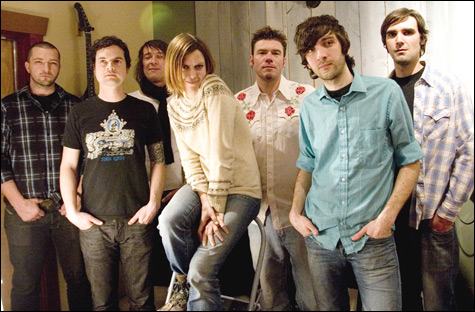
JULIANA ON FRANK SMITH: “It surprised me like any good music does, because I hate everything." |
Juliana Hatfield just compared herself with Bob Dylan. The veteran Boston singer-songwriter is sipping on an iced tea at 1369 Coffee House — which is near her home in Central Square — and talking about her recent collaboration with Frank Smith, the Boston-birthed alt-country-ish six-piece who relocated to Austin in March. (They return to town to play downstairs at the Middle East this Saturday.) “This is just like Bob Dylan and the Band. It’s just like that,” she says, shooting a wry smile to indicate that she’s joking. After years of recording as a solo artist with groups of individual musicians backing her, she says it was refreshing to play with a pre-existing band. “You can’t really impose that chemistry on a bunch of musicians taken from different places. You can hope for it, but you can’t count on it.”
The fruit of the partnership — a six-song EP, Sittin’ in a Tree . . ., which Hatfield released on her own Ye Olde Records imprint last Tuesday — is a toothsome cocktail, the marriage of Hatfield’s “peppy, poppy” songs, as she describes them, with Frank Smith’s country-rock sensibility. Hatfield wrote the tunes — leftovers that didn’t fit on her forthcoming solo album, which she’s been working on with Ivy’s Andy Chase in New York — and handed them over to the band to be arranged. “I trusted them to make the songs cool because their music is so great that I knew that their producer-arranger instincts would be good. So I let them take over.”

Frank frontman Aaron Sinclair and guitarist Scott Toomey took on the role of producers, tweaking the songs, sometimes radically. Hatfield cites “If Only We Were Dogs,” a creepy, subdued banjo-driven affair. “When I brought that one to them, it was a rocker. It was heavy guitar with the riff” — here she demonstrates with her voice and air ax. “They totally changed that around so it’s much darker and more sparse now.”
Did she never find it hard to accept such changes? “I made a choice to go with the flow. I’m pretty good about letting go of stuff when I trust somebody, and I trusted the songs with them. And I liked that they changed them because I wanted as much of Frank Smith in the songs as I could get. I didn’t want to impose my Juliana-ness — I wanted to absorb all the Frank Smith–ness I could.”
Which is amusing when you consider that the first couple of times she saw Frank Smith play — at the urging of numerous friends, including the band’s manager, Jeff Goodman — she found them “kinda boring.” Goodman had given her their 2005 full-length, Think Farms, but she never listened to it. Later he gave her an advance copy of their 2006 album, Red on White. “At some point I listened to it and I was like, ‘Holy shit. This is really good. It’s really good.’ It surprised me like any good music does, because I hate everything. And then I listened to Think Farms, and that was really good too.”
She went to see them live again, and this time it connected. “There’s a lot of things I like about them. The thing that hit me first is Aaron’s voice. It’s very distinctive. That’s always a good selling point for a band, I think, when the singer has an original sound. And the songwriting’s really good and really smart — not clever in an annoying way. There’s really interesting imagery in the lyrics and a wide range of feelings and moods. I love the dread and the doubt. But then there’s also this hopefulness here and there. It keeps unfolding the more I listen.”
So when Goodman and Sinclair came to her with the idea of releasing Frank Smith’s Heavy Handed Peace and Love — their fourth album in as many years — on Ye Olde, which Hatfield had established in order to release her own music after her contract with Rounder was up, she was happy to do so. (This happened before Sittin’ in a Tree . . . was conceived.) “It seemed like a great opportunity to put something else out on my label, something that I cared about and liked a lot.”
There’s plenty of the dread and doubt that Hatfield likes so much on HHP&L, most of which Sinclair wrote after coming out of a long relationship. On the opener, over a languid beat, mournful pedal-steel swells, and eerie electric-guitar atmospherics, he describes himself as “a liar and a thief, a cheat and a sneak.” Later on, the band re-imagine Holly Golightly’s post-break-up garage-rocker “Virtually Happy” as a dirge-like old-time waltz.
“I think it’s pretty hopeless and dark,” Sinclair says over the phone from Austin. “I definitely found kind of a weird spot for myself there for a while. I find it’s a lot harder for me to write songs when I’m happy — I don’t feel that productive and I don’t feel very inspired.”
And Hatfield says Frank Smith helped to rekindle her inner music-lover flame. “They took me by surprise. I thought I would never be excited again by anything.” Like a lot of local music fans, she’s bummed that they left town. “You don’t know what you’ve got till it’s gone. I was just barely starting to get to know him [Sinclair]. I somehow didn’t realize he existed until a year ago. He’s a major talent, but the world doesn’t know it yet. If I had a million dollars to spend I’d make him a big star.”
FRANK SMITH | Middle East downstairs, 480 Mass Ave, Cambridge | June 9 | 617.864.EAST